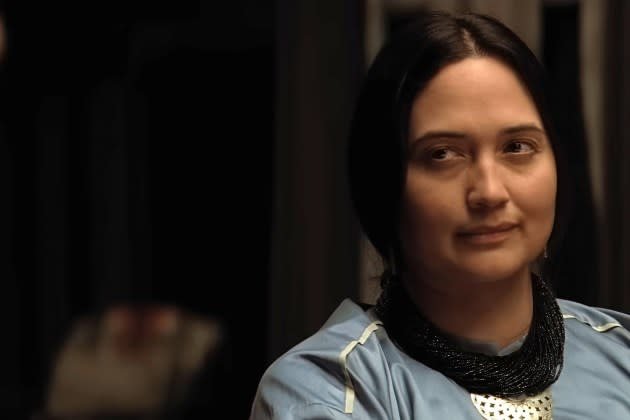Lily Gladstone On Devery Jacobs’ Criticism Of ‘Killers Of The Flower Moon’: “Her Reaction Is A Response To A Lot Of Trauma That Native Women Feel”


Recently, there has been a lot of discussion surrounding the upcoming film ‘Killers of the Flower Moon’ and the criticism it has received from Devery Jacobs, a prominent Native American actress. In a recent interview, Lily Gladstone, who is also a Native American actress and part of the film’s cast, shared her thoughts on Jacobs’ criticism and shed light on the underlying trauma that Native women experience.
‘Killers of the Flower Moon’ is an adaptation of David Grann’s non-fiction book of the same name, directed by Martin Scorsese and starring Leonardo DiCaprio and Robert De Niro. The film tells the story of the Osage Indian murders that took place in the 1920s, a dark chapter in American history that has often been overlooked. While the film aims to shed light on this important historical event, it has faced criticism for its casting choices and representation of Native American characters.
Devery Jacobs, known for her roles in ‘Rhymes for Young Ghouls’ and ‘American Gods,’ expressed her disappointment with the film’s casting decisions in a series of tweets. She argued that Native actors should have been given more prominent roles and that the film perpetuates the erasure of Native voices in Hollywood. Her criticism sparked a larger conversation about the lack of representation and opportunities for Native actors in the industry.
When asked about Jacobs’ criticism, Lily Gladstone responded with empathy and understanding. She acknowledged the trauma that Native women have endured and how it shapes their reactions to misrepresentation in media. Gladstone emphasized that Jacobs’ response is a reflection of the larger issues that Native women face, both historically and in contemporary society.
Gladstone highlighted the importance of Native representation in film and television, not only in terms of casting but also in the creative process. She stressed the need for Native voices to be heard and included in the storytelling process, as they bring a unique perspective and lived experience to the table. By amplifying Native voices, Gladstone believes that Hollywood can begin to break the cycle of misrepresentation and contribute to a more accurate and diverse portrayal of Native American stories.
It is crucial to recognize that the criticism of ‘Killers of the Flower Moon’ is not an isolated incident. Native American representation in Hollywood has long been a contentious issue, with limited opportunities for Native actors and a history of stereotypical portrayals. The erasure of Native voices perpetuates harmful stereotypes and denies the complexity and diversity of Native cultures and experiences.
While the film industry has made some progress in recent years, there is still much work to be done. Gladstone’s comments serve as a reminder that the fight for representation and inclusion is ongoing and requires the collective efforts of both Native and non-Native individuals in the industry.
As audiences, we also have a role to play in supporting and demanding more diverse and authentic representation. By seeking out and supporting films, TV shows, and other forms of media that prioritize accurate portrayals of Native American stories, we can contribute to a more inclusive and equitable entertainment landscape.
In conclusion, Lily Gladstone’s response to Devery Jacobs’ criticism of ‘Killers of the Flower Moon’ highlights the importance of Native representation in Hollywood. Her empathy and understanding towards Jacobs’ concerns shed light on the trauma that Native women have experienced and continue to face. The conversation sparked by this criticism serves as a reminder that the fight for representation and inclusion is ongoing and requires the collective efforts of all individuals involved in the industry.





